Subscribe to Baseball History Comes Alive for automatic updates (sign-up block found in right side-bar)
As a Free Bonus for subscribing, you’ll get instant access to my two Special Reports: Memorable World Series Moments and Gary’s Handy Dandy World Series Reference Guide!
Lou Brissie Photo Gallery
Click on any image below to see photos in full size and to start Photo Gallery:
A Genuine American War Hero: All-Star Pitcher Lou Brissie
“You can’t amputate my leg. I’m a ballplayer. You’ve got to find another way!” –Corporal Lou Brissie to Army field surgeons, contemplating amputating his leg following a severe battlefield injury
On this Veteran’s Day 2020, we salute a genuine American war hero: Lou Brissie. His is a story of one man’s extraordinary courage and unyielding determination in the face of overwhelming odds to fulfill his dream of one day pitching in the major leagues.
Lou Brissie eventually saw his dream come true and had a seven-year major league career with the Philadelphia A’s (1947-1951) and the Cleveland Indians (1951-1953), compiling a record of 44-48, with a 4.07 ERA, and 436 strikeouts. While Lou’s career numbers might seem rather ordinary, his path to the major leagues was anything but ordinary.
In the featured photo above, we see Lou Brissie, center, with Indians’ teammates, Al Rosen and Hank Majeski.
As a talented youth, the 6’ 4” Lou Brissie’s goal was always to pitch in the majors. In 1941, he attracted the attention of Connie Mack. Unfortunately for Lou and so many others of his generation, World War II rudely intervened, and the lifelong ambitions of many, including Lou Brissie, were suddenly placed on hold.
Lou enlisted in the Army in December, 1942 and soon found himself fighting with the 88th Infantry Division Blue Devils in the Apennine Mountains near Florence, Italy. Lou’s life changed forever on December 7, 1944, the third anniversary of Pearl Harbor. A 170-mm German artillery shell exploded near squad leader Brissie shattering his left leg and nearly killed him.
“Our unit suffered over 90 percent casualties,” Brissie recalled. “Within minutes we lost three of our four officers as well as eight enlisted men.” Brissie had to crawl for cover through the mud and then lay unconscious and near death until he was found hours later. Recovering at the Army field hospital, doctors told him that the injury to his leg was so severe it required amputation. As the above quote makes quite clear, Corporal Brissie would not hear of it. He begged with the surgeons to save his leg, “even if it means jeopardizing my life.” His urgent plea was honored and the amputation was canceled.
It would take more than a German mortar shell to keep Lou Brissie from fulfilling his dreams. Two years later, after 23 major operations, 40 blood transfusions, and countless hours of rehabilitation, Brissie miraculously returned to baseball, but now wearing a heavy metal brace. Connie Mack remembered Lou and was impressed by his determination. He decided to give the young war hero another chance and signed him on December 15, 1946. Lou was assigned to Savannah in the Southern League where in 1947 he surprised everyone by winning 25 games, with an incredible 1.91 ERA while striking out 278 batters.
The extraordinary performance earned Lou a ticket to the “Big Show,” and he was called up on September 28, 1947. Lou debuted in the final game of the year against the New York Yankees at Yankee Stadium on Babe Ruth Day. He lost the game 5-3, but to Lou it was anything but a loss: “I thought I had gone to heaven. It was a great experience.”
Near death and facing an amputation only three years earlier, Lou Brissie had realized his life’s ambition and was now a major league pitcher. He had his best seasons with the A’s in 1948 going 14–10, and 1949 when he was 16–11. He even pitched three innings for the American League in the 1949 All-Star game.
Lou’s wife, Diana Brissie, shared with me a few other interesting tidbits about Lou, recalling that he loved Ted Williams and frequently went fishing with him. He also worked with Ted on the campaign to reinstate Shoeless Joe Jackson. He never forgot Connie Mack and grew to have a deep affection and respect for the legendary Athletics manager.
Accolades for Lou came from many quarters over the years. His Athletics teammate Eddie Joost said about him: “Lou was courageous beyond belief. I admire him so much for what he did.” In the later years of his life, he received many honors, including an invitation to meet President George Bush at Dobbins Air Force base. Sportswriter Ira Berkow wrote his biography, The Corporal Was A Pitcher: The Courage of Lou Brissie. Famed horse breeder Cot Campbell was so impressed with the book that he named one of his colts “Lou Brissie.” The racehorse did quite well and placed third in the 68th running of the Aiken Trials in 2010 with Lou and Diana in attendance. Tom Brokaw, author of “The Greatest Generation” honored Lou at a World Series game.
The editor of the Baseball in Warfare website, Gary Bedingfield, added this: “The fact that Lou Brissie ever stepped foot on a baseball diamond again after World War II is a testament to this man’s sheer determination, courage, and will.”
As the years went by, Lou came to rely on crutches and was in constant pain. The injured leg never fully healed. He was frequently invited to speak to veterans of the wars in Iraq and Afghanistan. Once, when asked if he was a hero, Brissie, exhibiting the characteristic modesty of so many of his generation, replied, “I don’t think I am. But I knew some who are.” For his battlefield heroism, Lou received numerous decorations, including two Purple Hearts and the Bronze Star.
Brissie later served as the national director of American Legion Baseball. For his contributions to youth baseball, he received the “Americanism Award” at the Baseball Hall of Fame in Cooperstown. He was also elected to the South Atlantic League Hall of Fame in 1994. His number in Savannah was retired, and his high school in Ware Shoals, South Carolina named their baseball field after him.
We salute the service of Lou Brissie, a true American hero, who passed away on November 25, 2013 at the age of 89.
-Gary Livacari
Information: Excerpts and quotes edited from the Lou Bressie SABR Bioproject article, by Bill Nowlin; the “Baseball in Wartime” webpage; and the Lou Brissie Wikipedia page
Check out my latest book, recently nominated for the SABR 2020 Lawrence Ritter award: Reflections On the 1919 Black Sox: Time to Take Another Look now available on Amazon in e-book and paperback. All profits go to the Illinois Veterans Foundation
We are a participant in the Amazon Services LLC Associates Program, an affiliate advertising program designed to provide a means for us to earn fees by linking to Amazon.com and affiliated sites. Click here to view Amazon’s privacy policy
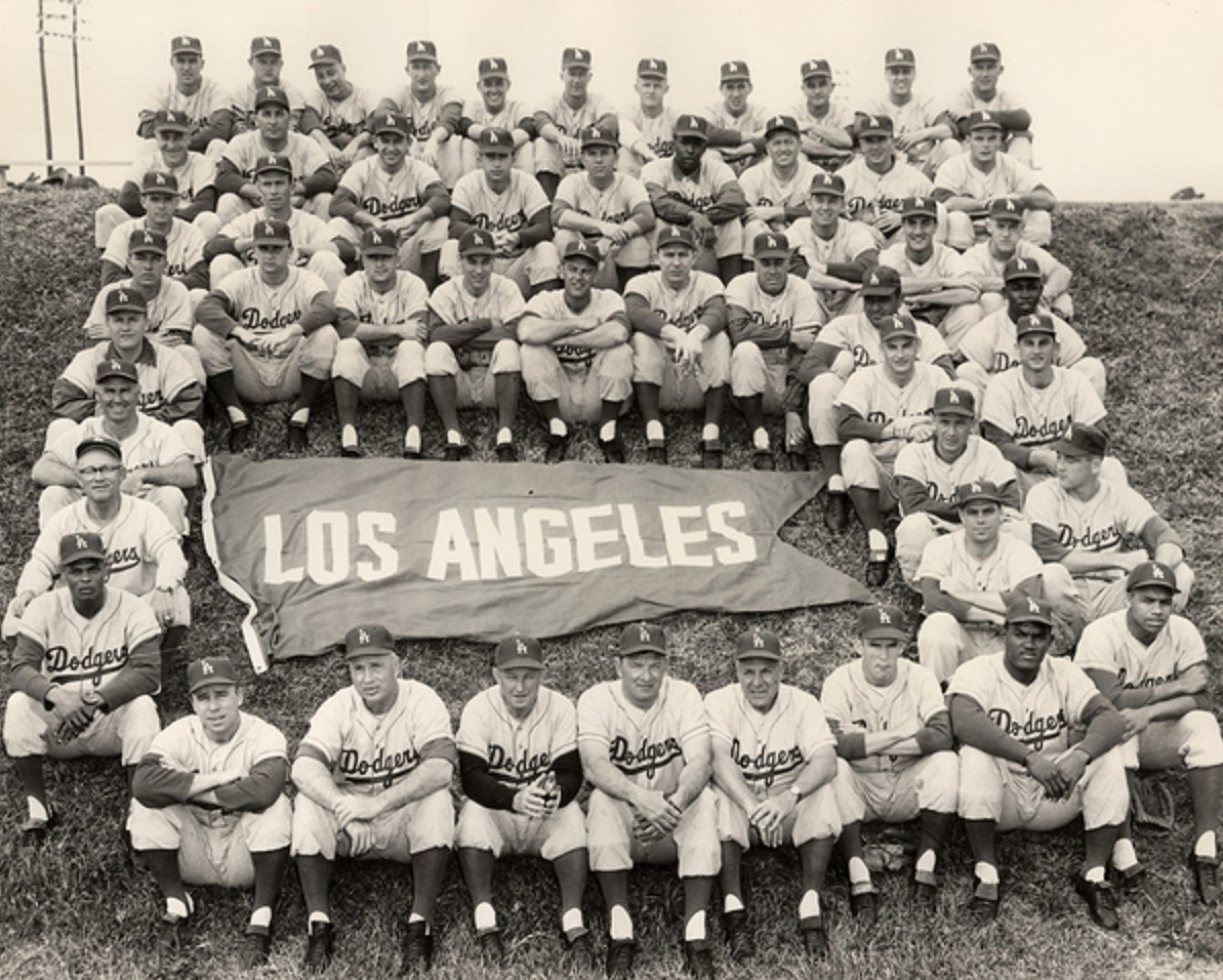
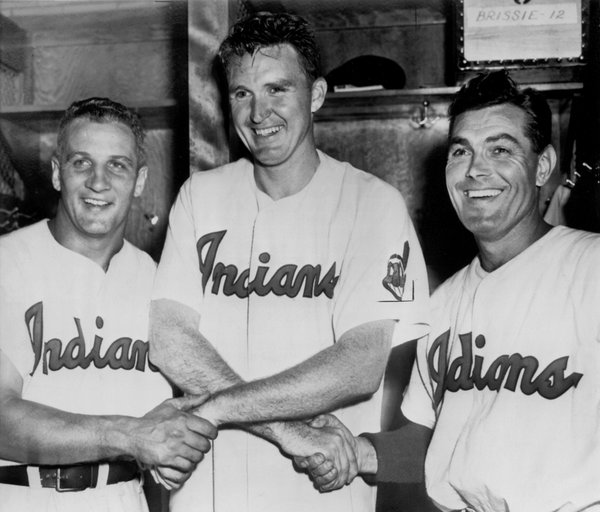
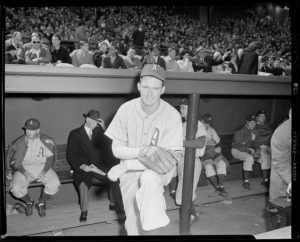
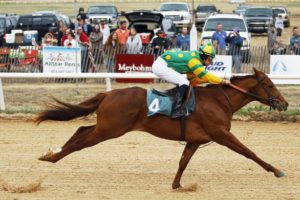
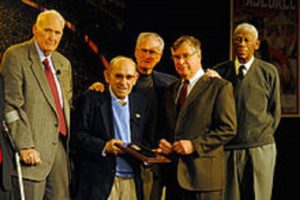
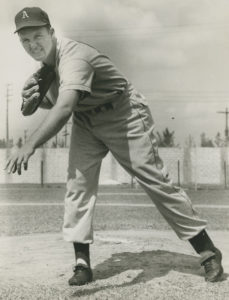
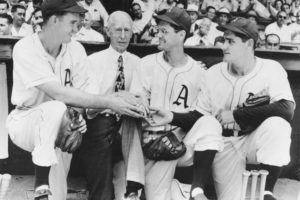
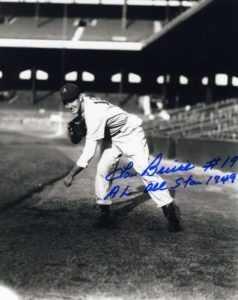
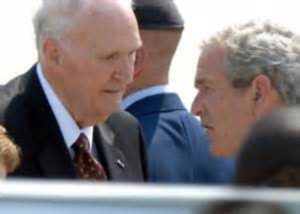
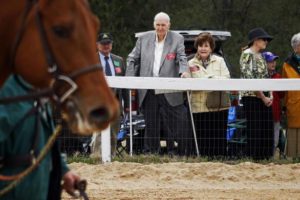
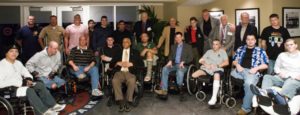
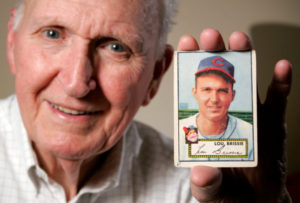
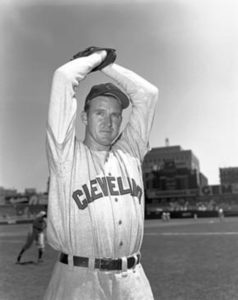
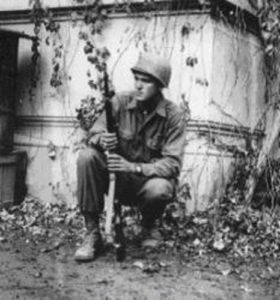
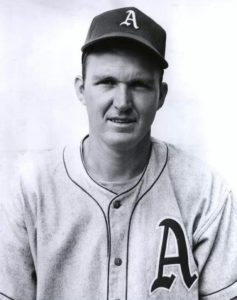
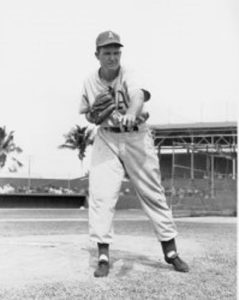
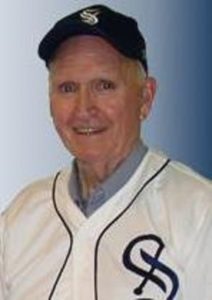
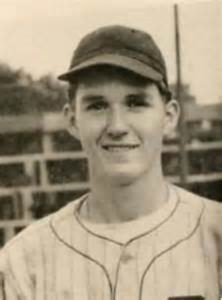
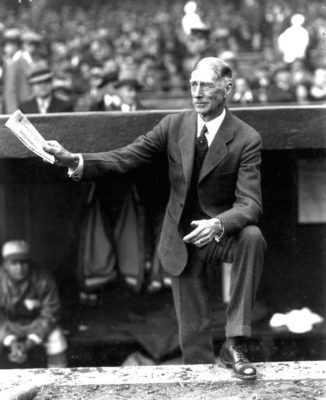
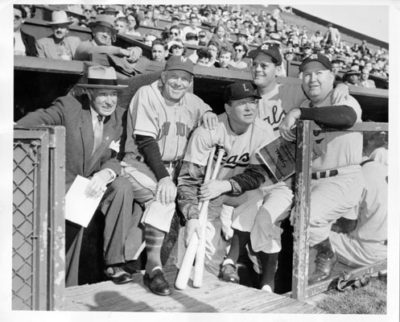

Thanks, Gary, Lou Brissie is a real “profile in courage.” Nice portrait.
Imagine begging the army docs to save his leg even if it meant death–not to mention his battlefield heroics.
As you point out, Lou got the most out of his compromised ability in ’48 and ’49, winning a combined 30 games for the A’s..
It brings to mind Monty Stratton who did have his leg amputated because of a hunting accident on his farm.
If you saw the 1949 film, The Stratton Story, you remember Jimmy Stewart, as Monty, pitching to his wife, played by June Allyson, with the barn as a backstop.The pitcher uncorked a fastball and knocked her on her rear end!
Best, Bill
Really a good story on this veteran’s day. The picture of Connie Mack in suit and tie in the Athletic dugout made me wonder, when was a big league manager last so attired during a game. Why should a manager wear spikes and a full uniform anyway? Can you see a football or basketball coach attired as are the players? I know it is an old tradition. But Connie Mack was the owner/manager of the Athletics for around 50 years and always wore a suit. I also remember Ted Turner as owner of the Braves and made himself manager for one day. As I recall the commissioner ruled he could not do that. My question is why not if you own the team? Once again many thanks for the very best site for info on baseball history.
Perfect for Veterans Day. Great story and totally new to me.
Gary, this is such a fitting tribute to veterans, and to Brissie in particular, on what Dr. Schaefer undoubtedly remembers as and chooses to call Armistice Day. We all thank you for it.
It seems that the genuinely heroic among us invariably downplay their own guts and determination in the face of life-threatening adversity, citing and praising the courage of others and declining to talk that much about themselves, if at all. So it was with Brissie, apparently, which makes him all the more authentic and appealing.
In his comment Dennis wonders about managers in plain clothes. Burt Shotton, who took over from Leo Durocher as Brooklyn’s manager, 1947-50, wore street attire in the Dodger dugout, although not necessarily a suit and tie, like Connie Mack did. He won pennants with them in ’47 and ’49, and came within an eyelash again in 1950. I believe he finished his managerial career in The Bigs less than one full day after Mr. Mack hung up his Sunday best.
At any rate it’s a special day. May we long remember, honor and salute our beloved veterans!